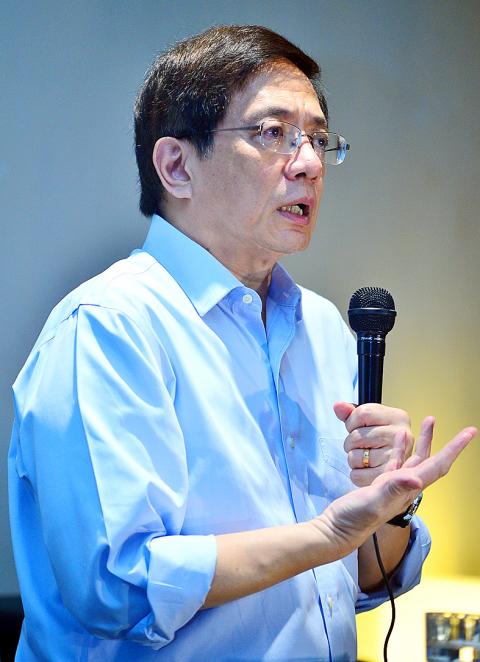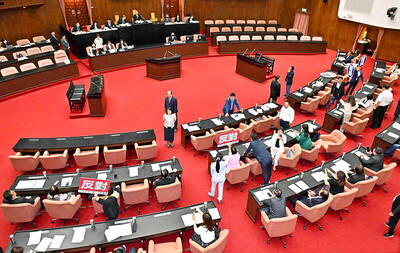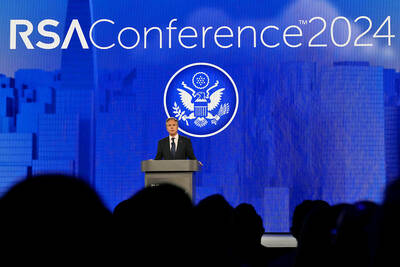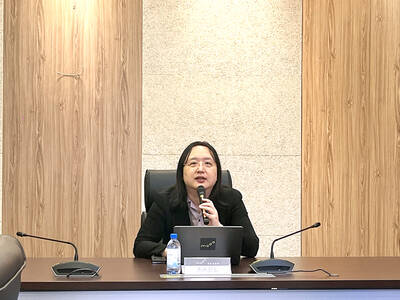National Taiwan University (NTU) on Friday night rejected allegations that university president-elect Kuan Chung-ming (管中閔) plagiarized a student’s master’s thesis on the grounds that Kuan’s conference paper was not a “formal publication.”
A conference paper published last year coauthored by Kuan and National Chi Nan University professor Chen Chien-liang (陳建良) entitled An Empirical Study of the Effect of the Economic Cooperation Framework Agreement on Exports contains 15 uncited sentences and charts that are highly similar to those in a master’s thesis published in 2016 by one of Chen’s students, Democratic Progressive Party Legislator Chang Liao Wan-chien (張廖萬堅) told a news conference on Thursday.
The university said in a statement on Friday that Kuan did not violate its code of academic conduct, because the conference paper was not a “completed and formal publication that must conform to the specific academic style of its discipline.”

Photo: Wang Yi-sung, Taipei Times
After consulting with the Academia Sinica Research Center for Humanities and Social Sciences, which co-organized the conference with the NTU Department of Economics, the university’s ethics committee concluded that the conference was an “informal conference [for academics to] share their research and receive feedback,” the university said.
Conference papers were not peer-reviewed and were only published in the conference proceedings, the university said.
The proceedings were designed to facilitate discussion among participants and do not have an international standard book number, NTU said, adding that conference papers are not available in major libraries and have not been formally distributed.
The university also said in the statement that Kuan had obtained its approval to serve as an independent director of Taiwan Mobile Co(台灣大哥大) on May 17 last year.
Wang Li-sheng (王立昇), an NTU professor and ethics committee member, said Academia Sinica had told the university that the conference proceedings were “a collection of working papers.”
However, the conference’s call for papers clearly required participants to submit their “full paper” by April 4 last year, and Kuan’s paper appears to be complete and does not contain any notes stating that it is a work in progress.
Several academics yesterday accused NTU of failing to properly investigate the accusations of plagiarism.
“There is no such a thing as an informal research paper,” NTU Department of Agronomy professor Warren Kuo (郭華仁) said, adding that the ethics committee members are unqualified for their job.
NTU Graduate Institute of National Development professor Liu Ching-yi (劉靜怡) questioned Academia Sinica’s role in supporting the university’s claim that papers presented at the conference were informal.
“Why is Academia Sinica diminishing the value of its own conference?” she asked, adding that maybe the institution should tell famous academics planning to attend Academia Sinica conferences that there is no need to go, because their papers would not be treated as “formal papers.”
Academics should take responsibility for any works they publish and where they publish is irrelevant when determining what constitutes plagiarism, National Taiwan Normal University Department of English professor Huang Han-yu (黃涵榆) said, adding that academics could even be charged with fraud if they received research subsidies for a paper they plagiarized.
Kuan’s supporters at NTU late on Friday set up a Web page demanding that Ministry of Education respect the university’s autonomy.
At press time last night, the page had collected more than 1,000 signatures from supporters, including former NTU presidents Sun Chen (孫震) and Lee Si-chen (李嗣涔).

STATE OF THE NATION: The legislature should invite the president to deliver an address every year, the TPP said, adding that Lai should also have to answer legislators’ questions The Chinese Nationalist Party (KMT) yesterday proposed inviting president-elect William Lai (賴清德) to make a historic first state of the nation address at the legislature following his inauguration on May 20. Lai is expected to face many domestic and international challenges, and should clarify his intended policies with the public’s representatives, KMT caucus secretary-general Hung Meng-kai (洪孟楷) said when making the proposal at a meeting of the legislature’s Procedure Committee. The committee voted to add the item to the agenda for Friday, along with another similar proposal put forward by the Taiwan People’s Party (TPP). The invitation is in line with Article 15-2

PLAN: Nations would receive US$5m a year if they could advance Taiwan’s international participation, diversify supply chains away from China or counter Beijing’s influence The US House of Representatives Select Committee on Strategic Competition Between the US and the Chinese Communist Party (CCP) on Friday introduced a bill that would approve US$120 million to be spent on supporting Taiwan’s international space and tackling coercion by China. The bipartisan legislation — the Taiwan Allies Fund Act — was proposed ahead of the inauguration of president-elect William Lai (賴清德) of the Democratic Progressive Party (DPP) on May 20. The committee said in a statement that the bill “strengthens Taiwan’s global network of friends by authorizing [US]$120 million over three years for the State Department and USAID [US Agency

‘DIGITAL SOLIDARITY’: Taiwan, the US, Japan, Australia and New Zealand are to install and operate a cable that would connect up to 100,000 people in the Pacific Islands Taiwan, the US, Japan, Australia and New Zealand are working together to install undersea cables as a demonstration of digital solidarity, US Secretary of State Antony Blinken said on Monday. Blinken talked about the cooperation in a speech he delivered at the RSA Conference in San Francisco. He said that the US International Cyberspace and Digital Strategy launched by the US Department of State “treats digital solidarity as our North Star.” “Solidarity informs our approach not only to digital technologies, but to all key foundational technologies,” Blinken said. Under the strategy, the US is to work with international partners “to shape the design, development,

POSSIBLE SOLUTION: The government needs to convey regulations to advertising platforms based overseas and access to the offenders could be restricted, Minister said The government is considering asking TikTok and other large digital advertising platforms to have agents based in Taiwan in accordance with the draft act on the prevention and control of fraud and crime, which is scheduled to be reviewed at an Executive Yuan meeting today, the Ministry of Digital Affairs said yesterday. The draft act is one of the legislative measures being introduced by the government to tackle scams, including the draft technology investigation and security act, and amendments to the Money Laundering Control Act (洗錢防制法) and the Communication Security and Surveillance Act (通訊保障及監察法). They are also to be reviewed